
On Tuesday afternoon Larry Ingram knew his family’s business was in trouble. The California statewide order to shut down all in-place dining had just gone into effect and revenue across all nine of his family’s award-winning Bay Area restaurants immediately fell off a cliff.
These are difficult days for those running restaurants as the COVID-19 Pandemic radically alters the industry. The National Restaurant Association estimates that the entire industry will lose $225 billion in the coming three months and shed five to seven million employees.
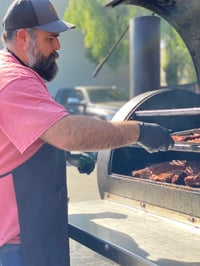 Larry, his father and his two brothers Eric and Franz started the family business, Real Smoked BBQ, 25 years ago near their home in Aptos, California just down the road from Santa Cruz. It has since grown into a well-known and profitable operation that prides itself on high quality BBQ at each of their nine regional locations including Aptos Street BBQ, considered one of the top 50 BBQ establishments in the country. Larry emphasizes that each location operates under a different name and brand “because we’re very much against the chain mentality.”
Larry, his father and his two brothers Eric and Franz started the family business, Real Smoked BBQ, 25 years ago near their home in Aptos, California just down the road from Santa Cruz. It has since grown into a well-known and profitable operation that prides itself on high quality BBQ at each of their nine regional locations including Aptos Street BBQ, considered one of the top 50 BBQ establishments in the country. Larry emphasizes that each location operates under a different name and brand “because we’re very much against the chain mentality.”
The changes brought about by the Coronavirus happened quickly and with little advance warning. Overnight, restaurants found that they had to radically alter their business model and the way they served their customers. Like many in their situation, Larry and his brothers quickly pivoted operations to a take-out and delivery model.
 Hope came from beer, of all things. Two days after things hit rock bottom, a new directive allowed restaurants to sell beer for takeout and delivery. The ability to sell “growlers” – large jugs for craft beers, popular with home brewers – was a lifeline for restaurants where beer was an important part of the menu.
Hope came from beer, of all things. Two days after things hit rock bottom, a new directive allowed restaurants to sell beer for takeout and delivery. The ability to sell “growlers” – large jugs for craft beers, popular with home brewers – was a lifeline for restaurants where beer was an important part of the menu.
The rapidly changing regulatory environment, along with changes in customer behavior and demand required fast action. “The earth is moving under our feet, but the reality is, there has never been a better time to do food delivery,” said Larry.
What about food safety in this new environment?
"It’s important to remember that the safety of our guests and employees is the first thing on our mind here. Once we understood the guidelines of the CDC and local health departments we went to work making the adjustments necessary. Communicating with staff the importance of adhering strictly to sanitary protocols is extremely critical and also making sure that they felt comfortable working in the new environment was something we had to discuss," said Larry.
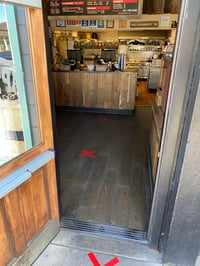 Staff at all Real Smoke locations frequently sanitize touch points like credit card terminals and door handles. Sauces and condiments are pre-packaged. Tape markers on the ground indicate the distance people must keep when picking up an order. In addition, windows and doors to the kitchens remain open to allow fresh air flow.
Staff at all Real Smoke locations frequently sanitize touch points like credit card terminals and door handles. Sauces and condiments are pre-packaged. Tape markers on the ground indicate the distance people must keep when picking up an order. In addition, windows and doors to the kitchens remain open to allow fresh air flow.
“Customers are very safe. Staff wear gloves and we limit the number of people in the building for pickup,” said Larry.
Another challenge for restaurants with the sudden onset of Coronavirus has been the availability of supplies needed to pivot to a delivery model. This goes beyond toilet paper. Think napkins, take-out boxes and packaged utensils.
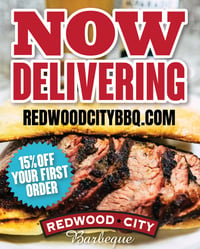 Taking swift action made a difference. While supplies present an ongoing challenge for everyone, Larry's team had the foresight to increase their orders in the early days of the outbreak.
Taking swift action made a difference. While supplies present an ongoing challenge for everyone, Larry's team had the foresight to increase their orders in the early days of the outbreak.
From those early rock bottom days – only a few weeks ago – Larry estimates that about half of his business has recovered. But his is a cautious optimism.
"I have to say our staff is amazing," said Larry. "Some of them have offered to take pay cuts and some of them even zero pay to get through the crisis. While we did have to send many home for the time being we are working hard at bringing our business level up to where they can return and it’s looking like we’re going to get through this with the help of our wonderfully talented staff."
What recommendations does he have for others in his industry facing similar challenges?
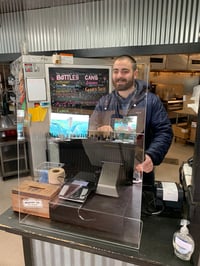 “Moving to a temporary, take-out-only menu has been key," said Larry, noting the importance of pre-packaging everything and shrinking the menu to items that make sense. In addition to cutting costs, the goal was to minimize food waste and labor.
“Moving to a temporary, take-out-only menu has been key," said Larry, noting the importance of pre-packaging everything and shrinking the menu to items that make sense. In addition to cutting costs, the goal was to minimize food waste and labor.
In addition, Larry and his team made numerous physical changes to each location such as adding transparent sneeze guards at the take-out register, minimizing tables and removing touch points like condiment stations to create space for customers to practice social distancing.
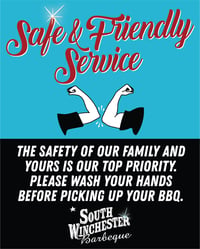 “Guidance and communication are important — making sure signs are clearly posted to inform customers of new rules. Most customers are understanding and happy to cooperate," he said.
“Guidance and communication are important — making sure signs are clearly posted to inform customers of new rules. Most customers are understanding and happy to cooperate," he said.
No one can predict with certainty what will happen to the restaurant industry during these challenging times, but as long as customers are ordering meals and seeking out great food, owners like Larry Ingram and his family will continue to find ways to succeed, safely and profitably.
Lorem ipsum dolor sit amet, consectetur adipiscing elit

These Stories on Food Biz Buzz
Procurant USA LLC
475 Alberto Way - Suite 230
Los Gatos, CA 95032
1-669-221-1026
info@procurant.com
